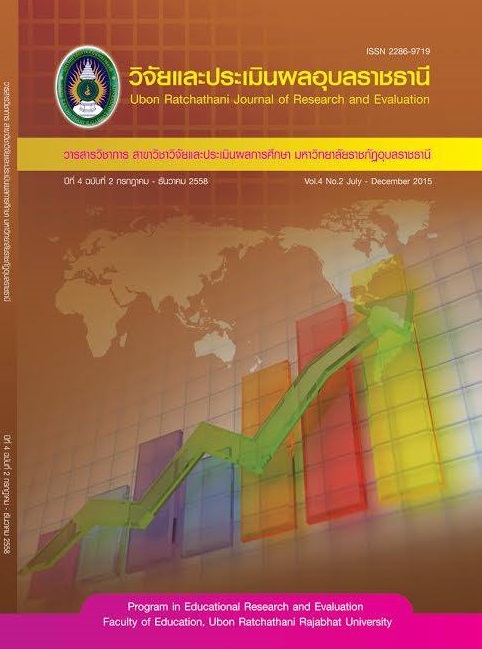A Development of Thai Verse Writing Called Khlong Si Supharb Using CIPPA Model for Mathayom Suksa 3 Students, Namyuen wittaya School, Secondary Educational Service Area Office 29
Keywords:
Thai Verse Writing Called Khlong Si Supharb, Academic Achievement, CIPPA Model, Action ResearchAbstract
The purposes of this study were to : (1) deveop students’ learning acievement on writing Thai verse called Khlong Si Supharb, (2) compare the students’ academic achievement before and after learning, and (3) compare students’ learning achievement learned by the CIPPA Model with a regular teaching method. The samples were the experimental group using 35 students, and the control group using 35 students Mathayom Suksa 3 students from Namyuenwithaya school in the second semester academic year 2014, selected by cluster random sampling. The research instruments were nine lesson plans using CIPPA Model and nine lesson plans using regular method of teaching; achievement test, end-of-cycle test, observation form on teacher’s teaching behaviors, observation form on students’ learning behaviors, student interviewing form, and the teacher log book. The statistical procedures were mean, standard deviation, and t-test.
The research findings were as follows:
- The deveopment of academic acievement using the CIPPA Model improved the students’ learning achievement.
- It was found that the students’ academic achievement after learning were higher than before learning with statistical significance at the critical level .05.
- The students learned by using the CIPPA Model had higher learning achievement than those using the regular method of teaching with statistical significance at the critical level .05.
References
นงลักษณ์ เชียรหอม. การพัฒนาการจัดกิจกรรมการเรียนรู้แบบซิปปา กลุ่มสาระการเรียนรู้ภาษาไทย เรื่อง กระจงน้อยจากป่าใหญ่ ชั้นมัธยมศึกษาปีที่ 2. การศึกษาค้นคว้าอิสระการศึกษามหาบัณฑิต มหาวิทยาลัยมหาสารคาม, 2547.
บุญฤดี แซ่ล้อ. การจัดการเรียนการสอนวิทยาศาสตร์ โดยใช้รูปแบบการเรียนการสอนแบบซิปปาที่มีต่อผลสัมฤทธิ์ทางการเรียนวิชาวิทยาศาสตร์ ทักษะกระบวนการทางวิทยาศาสตร์ และเจตคติทางวิทยาศาสตร์ของนักเรียนชั้นประถมศึกษาปีที่ 5. วิทยานิพนธ์ครุศาสตรมหาบัณฑิต จุฬาลงกรณ์มหาวิทยาลัย, 2545.
ประกาศิต ปลั่งกลาง. การพัฒนากิจกรรมการเรียนการสอนการแก้โจทย์ปัญหาคณิตศาสตร์ ชั้นประถมศึกษา
ปีที่ 5 ที่เน้นผู้เรียนเป็นสำคัญโดยใช้โมเดลซิปปา. วิทยานิพนธ์ศึกษาศาสตรมหาบัณฑิต มหาวิทยาลัยขอนแก่น, 2545.
รุ้งลาวัลย์ เดิมทำรัมย์. การพัฒนาแผนการจัดกิจกรรมการเรียนรู้แบบซิปปา เรื่องโคลงโลกนิติ วิชาภาษาไทย ท306 ชั้นมัธยมศึกษาปีที่ 3. การศึกษาค้นคว้าอิสระการศึกษามหาบัณฑิต มหาวิทยาลัยมหาสารคาม, 2547.
น้ำยืนวิทยา, โรงเรียน. รายงานการพัฒนาคุณภาพการศึกษา ปีการศึกษา 2556. อุบลราชธานี:
โรงเรียนน้ำยืนวิทยา, 2556.
วารยาณีย์ เพชรมณี. การพัฒนากิจกรรมการเรียนการสอนวิชาชีววิทยา โดยใช้โมเดลซิปปารายวิชาชีววิทยาสำหรับนักเรียนชั้นมัธยมศึกษาปีที่ 4. วิทยานิพนธ์ศึกษาศาสตรมหาบัณฑิต มหาวิทยาลัยขอนแก่น, 2545.
ศึกษาธิการ, กระทรวง. ตัวชี้วัดและสาระการเรียนรู้แกนกลาง กลุ่มสาระภาษาไทยตามหลักสูตรแกนกลางการศึกษาขั้นพื้นฐาน พ.ศ. 2551. กรุงเทพฯ: โรงพิมพ์คุรุสภาลาดพร้าว, 2551 ก.
. หลักสูตรการศึกษาขั้นพื้นฐาน พุทธศักราช 2551. กรุงเทพฯ: โรงพิมพ์คุรุสภาลาดพร้าว, 2551 ข.
สมพร จารุณัฏ. การวางแผนการเรียนการสอน สื่อและกระบวนการ. กรุงเทพฯ: ศูนย์พัฒนาหนังสือ
กรมวิชาการ กระทรวงศึกษาธิการ, 2543.
สมศักดิ์ สินธุระเวชญ์. “การประกันคุณภาพการศึกษา,” วิชาการ. 1,4 (เมษายน 2541): 31.
สุวิมล ว่องวาณิช. การวิจัยปฏิบัติการในชั้นเรียน. พิมพ์ครั้งที่ 10. กรุงเทพฯ: สำนักพิมพ์แห่งจุฬาลงกรณ์มหาวิทยาลัย, 2550.
Downloads
Published
How to Cite
Issue
Section
License
1. บทความที่ตีพิมพ์ในวารสารนี้ได้มีการตรวจสอบการลอกเลียนงานวรรณกรรมแล้ว ไม่เกินร้อยละ 25
2. บทความที่ตีพิมพ์ในวารสารนี้เป็นข้อคิดเห็น ข้อค้นพบของผู้เขียนบทความ โดยผู้เขียนบทความต้องเป็นผู้รับผิดชอบต่อผลทางกฎหมายใด ๆ ที่อาจเกิดขึ้นจากบทความนั้น ๆ
3. บทความ ข้อมูล เนื้อหา รูปภาพ ฯลฯ ที่ได้รับการตีพิมพ์ในวารสารวิจัยและประเมินผลอุบลราชธานี ถือเป็นลิขสิทธิ์ของวารสารวิจัยและประเมินผลอุบลราชธานี หากบุคคลหรือหน่วยงานใดต้องการนำทั้งหมดไปเผยแพร่ต่อหรือเพื่อกระทำการใดๆ จะต้องได้รับอนุญาตเป็นลายลักษณ์อักษรจากวารสารวิจัยและประเมินผลอุบลราชธานีก่อนเท่านั้น และจะต้องมีการอ้างอิงวารสารวิจัยและประเมินผลอุบลราชธานี ฉบับนั้น ๆ ด้วย






